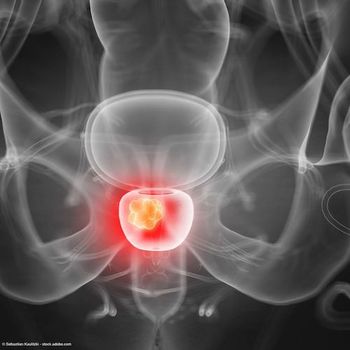
Phase 3 mCRPC study of novel PSMA-targeted therapy hits key milestone
The pivotal phase 3 SPLASH study is exploring the novel PSMA-targeted therapy PNT2002 in patients with metastatic castration-resistant prostate cancer.
The pivotal phase 3 SPLASH study exploring the novel PSMA-targeted therapy PNT2002 in patients with metastatic castration-resistant prostate cancer (mCRPC) has completed enrollment and initial dosing of its safety and dosimetry lead-in phase.1
The findings from this initial 25-patient, open-label lead-in phase will be assessed prior to launching the official randomization phase of the SPLASH trial. The trial is specifically enrolling patients whose tumors express PSMA; who have experienced disease progression on an androgen receptor–axis-targeted therapy (abiraterone acetate [Zytiga], enzalutamide [Xtandi], darolutamide [Nubeqa], or apalutamide [Erleada]) in either the castration-sensitive or CRPC setting; and who are not eligible for or decline chemotherapy.
“Completing the enrollment of the safety and dosimetry lead-in is an important step on our journey to offer a new treatment option to patients battling mCRPC, a highly aggressive form of cancer with few therapeutic options. We look forward to starting the randomization part of the trial phase globally,” Neil Fleshner, MD, chief medical officer of POINT Biopharma, the developer of PNT2002, stated in a press release.
The targeted radioligand therapy PNT2002 is a combination of a PSMA-specific ligand and the beta-emitting radioisotope lutetium-177.
The randomization phase of the multicenter, open-label, SPLASH trial (NCT04647526) will randomly assign patients in a 2:1 ratio to either PNT2002 (arm A) or abiraterone or enzalutamide (arm B).2 Crossover from the control arm to receive PNT2002 will be allowed at radiographic progression among patients who meet the study protocol eligibility criteria.
The targeted enrollment of the trial is 400 patients. Patients must have an ECOG performance status of 0 to 1 and a positive PSMA-PET scan on a validated test, such as 68Ga-PSMA-11 or 18F-DCFPyL (piflufolastat F 18; Pylarify).
Patient enrollment will occur at sites in North America, Europe, and the United Kingdom. The primary endpoint of the study is radiographic progression-free survival (rPFS). Other key end points include overall response rate, overall survival, biochemical PFS, duration of response, pharmacokinetics, and safety.
The estimated primary completion date for the randomization phase is March 2023; however, data from the lead-in phase will be made available prior to that time. Overall, patients will continue to be followed for up to 5 years following their first treatment dose.
“Patient enrollment and initial dosing was completed significantly ahead of schedule,” Joe McCann, Phd, CEO of POINT Biopharma, stated in a press release. “I am incredibly proud of our team for this achievement, especially considering it occurred during an unprecedented global pandemic. I believe the speed of enrollment further highlights the caliber of POINT’s team, as well as the unmet need of patients and physicians for additional treatments for advanced prostate cancer.”
References
1. POINT Biopharma Announces Early Completion of Enrollment and Initial Dosing in the Lead-In of its Phase 3 SPLASH study of PNT2002 for mCRPC. Published online August 10, 2021. Accessed August 11, 2021.
2. United States National Institutes ofHealth National Library of Medicine. ClinicalTrials.gov. Study Evaluating mCRPC Treatment Using PSMA [Lu-177]-PNT2002 Therapy After Second-line Hormonal Treatment (SPLASH). Site last updated July 29, 2021. Accessed August 11, 2021. https://www.clinicaltrials.gov/ct2/show/NCT04647526.
Newsletter
Stay current with the latest urology news and practice-changing insights — sign up now for the essential updates every urologist needs.






